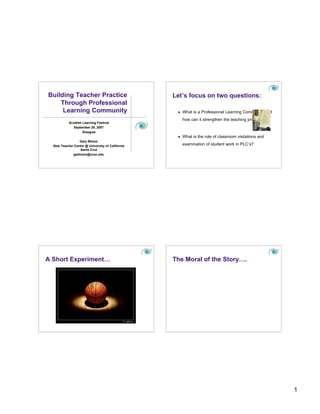
Building Communities of Practice Tcm4 451018
- 1. Building Teacher Practice Let’s focus on two questions: Through Professional Learning Community What is a Professional Learning Community and how can it strengthen the teaching profession? Scottish Learning Festival September 20, 2007 Glasgow What is the role of classroom visitations and Gary Bloom New Teacher Center @ University of California examination of student work in PLC’s? Santa Cruz gsbloom@ucsc.edu A Short Experiment… The Moral of the Story…. 1
- 2. Changing Expectations What Is a Profession? Changing our Profession Professional Area Traditional Model Model Specialized body of knowledge Teaching Loosely coupled and Standards based and Set of skills Content idiosyncratic articulated Teaching Teacher as artisan, isolated, Teacher as professional, standards based, public, Group mission or identity Practice idiosyncratic collaborative Standards of behavior and practice Accountability De-emphasized, mystified Public, prominent Equity Implicit and input oriented Explicit and outcome oriented What Can Coronary Stents and PLC’s are grounded in Etienne Wenger’s Luxury Cars Tell Us About What it Communities of Practice Means to be a Profession? “ Communities of practice are formed by people who engage in a process of collective learning in a shared domain of human endeavor: a tribe learning to survive, a band of artists seeking new forms of expression, a group of engineers working on similar problems, a clique of pupils Vs. defining their identity in the school, a network of surgeons exploring novel techniques. In a nutshell, communities of practice are groups of people who share a concern or a passion for something they do and learn to do it better as they interact regularly.” 2
- 3. A Medical Model: Elements of Professional Content Content Clinical Oncology Development Job- Job- Hospital rounds Embedded Embedded Reflective Elaboration Elaboration Work Work Practice & Personal Responsibility • Weekly Cancer Conference Communities of Communities of Reading & Reading & Research Research Practice: Practice: Networking and • Mortality Review Networking and Benchmarking Benchmarking Attributes of PLC’s Richard Elmore’s Definition Southwest Educational Development Lab, 1997 Collegial and facilitative participation of the High alignment among responsibility, principal; shared leadership expectatons and accountability Unswerving commitment to student learning High transparency of practice Collective professional learning applied to Explicit norms, processes, structures of practical solutions addressed to student accountability needs Visitation and review of each teacher’s High support: focused, individualized classroom behaviors and results by peers High agency: “If I can’t do it, they will help with feedback directed at individual and me. If we can’t do it, we will learn how.” community improvement Physical conditions and human capacities that support such an operation 3
- 4. Grade-Level/ Nested Department Teams K Let’s Visit a Classroom Instructional Principal Leadership 1 Professional Teams Teams 2 Classroom Learning 3 Learning 4 Communities First year teacher Communities ES 5 Kindergarten class E M English Language Learners S H MS FL A What do you see in this classroom? E M S HS H FL A How Would You Discuss Your Some Thoughts on Adult Observation With Your Colleagues? Learners Non-judgmental statements Adults want to be the origin of their own learning and should have some control over the what, who, Evidence v. opinion how, why, when of their learning. Focus on student engagement Adults come to the learning process with self- direction and a wide range of previous knowledge, Focus on student learning interests,and competencies. Focus on cause & effect Adults will resist activities they see as an attack on their competence. Safe and supportive Speck & Knipe, Professional Development; Why Can’t We Get it Right In Our Schools? 4
- 5. Learning Walks, Quick Visits, A Typology of Collaborative Professional Walkthroughs Classroom Visitations Learning Walks Support professional learning communities Informing school level professional learning communities focused upon teaching and learning Data Walks Strengthen teaching as public practice informed Gathering quantitative school and/or district data by standards Peer Coaching Support the success of every teacher and every Informing individual teacher professional development student Principal Professional Learning Walks Are organized around evidence based processes, Informing administrator professional development protocols and cycles of inquiry Quick Visits Informing the teacher supervision and support process Learning Walks Data Walks WHY: Informing school level PLC’s WHY: Gathering quantitative school and/or district WHO: Teachers, teacher leaders, heads data for program evaluation purposes WHAT: Gather quantitative and qualitative WHO: Teachers, teacher leaders, heads, central data to inform conversations and action leadership planning in site level PLC’s; to give feedback WHAT: Gather quantitative data to assess needs to individuals and to groups and program implementation. Data are aggregated to focus upon units, not individual teachers WHEN: Quarterly to monthly, usually WHEN: One to four times a year, usually announced announced 5
- 6. Teacher Professional Learning Communities Other Visitation Types Examine Student Work Peer Coaching Looking for evidence of Principal (Head) Professional Learning Walks Rigor Quick visits Fidelity to standards Learning! What sorts of student work might PLC’s examine? Cultural Shifts in a Professional Learning Community A shift in purpose… From a focus on teaching to a focus on learning A shift in the work of teachers… From isolation to collaboration A shift in school culture… From independence to interdependence A shift in professional development… From external training to job embedded learning Adapted from Learning by Doing , DuFour 6
- 7. Professional Learning Communities informed by public practice can be the chassis that professional development and school Building Teacher Practice improvement ride upon. Through Professional Learning Community Scottish Learning Festival September 20, 2007 Glasgow Gary Bloom New Teacher Center @ University of California Santa Cruz What support do you need to strengthen the gsbloom@ucsc.edu establishment of PLC’s and learning walks and other public practice at your site? 7
